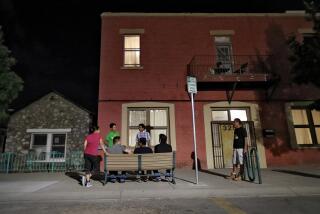Federal Judge Again Blocks Return of Refugees to Haiti : Repatriation: Court order says attorneys must be allowed to advise boat people of their rights. An appeal to the Supreme Court is expected.
- Share via
MIAMI — For the third time in less than a month, U.S. District Judge C. Clyde Atkins on Friday thwarted the Bush Administration’s plan to begin the forced repatriation of more than 6,000 Haitian refugees being held at the U.S. Navy base at Guantanamo Bay, Cuba.
In issuing yet another preliminary injunction blocking the Haitians’ return, Atkins said attorneys for the refugees must be permitted to interview them and advise them of their legal rights before they can be sent back to a country that has been under military rule since a coup toppled President Jean-Bertrand Aristide on Sept. 30.
In his order, Atkins said that allowing attorneys access to Haitians held in custody “would further the government’s interest in assuring that no political refugee was wrongly repatriated.”
“This is great news, just great news,” said Cheryl Little, an attorney representing the refugees. But Little quickly added that she believed the government was sure to appeal Atkins’ ruling again, the U.S. 11th Circuit Court of Appeals would likely overturn it again, and the next stop for the case would be the Supreme Court.
Attorneys for the refugees said they are prepared to ask Supreme Court Justice Anthony M. Kennedy for a ruling as early as this weekend.
In the hours before Atkins’ ruling, Bush Administration officials revealed that they had ordered the Coast Guard to begin returning the refugees to Port-au-Prince, Haiti, as early as Sunday. The Haitians would have been turned over to the local Red Cross at the rate of 500 a day, one official said.
Since Oct. 29, more than 7,700 Haitians have been picked up at sea by the Coast Guard as they attempted to sail to Florida in wooden sailboats that were usually overcrowded and unseaworthy. On Friday, 6,609 Haitians were in two tent camps at the Navy base at Guantanamo Bay, while nine others were aboard ships at sea.
Of those refugees, 1,247 have been found to have a plausible claim to political asylum and will be brought to the United States after medical screening, including an AIDS test.
The Administration contends that most of the Haitians are economic refugees and thus not eligible for asylum. Granting them admission to the United States would unleash a flood of Haitian immigration, government officials say.
The ruling by Atkins, a feisty, 76-year-old Miami judge, represents another strand in a intricate web of legal skirmishing that began Nov. 18 when the Haitian Refugee Center in Miami sued the government, charging that shipboard interviews conducted by U.S. Immigration and Naturalization Service officers were inadequate to determine which refugees had valid claims for political asylum.
The federal district court in Miami granted the first temporary injunction halting the repatriations last month after 538 Haitians had been sent back to their Caribbean nation, the poorest in the hemisphere.
Since then, the government has twice persuaded a three-judge panel of the appeals court in Atlanta to lift the injunction, and Atkins has reinstated it three times.
In oral arguments before Atkins Friday morning, Asst. Atty. Gen. Stuart M. Gerson asserted that the Haitians had no rights to due process under the First Amendment to the Constitution because they were not on U.S. soil. Gerson further contended that attorneys for the refugees are seeking access to the Haitians at Guantanamo Bay simply as a ruse to block the government from resuming repatriation.
“There was a riot (at Guantanamo Bay) last Sunday,” said Gerson, adding that the presence of advocates for the refugees would only heighten tension in the two tent camps at the Navy base. “It makes no sense to stir that up if we can avoid it,” he said.
Ira Kurzban, appearing on behalf of the Haitians, argued that the refugees are indeed on American soil at the Navy base, “on land in what is a slice of America,” and had a right to speak to their lawyers.
Kurzban also disputed Gerson’s version of last Sunday’s events, when some Haitians tried to jump over rolls of razor wire and were shoved back by military guards. Kurzban called the incident a “disturbance” caused chiefly by the refugees’ lack of information about their fate.
Staff writers Don Shannon and Melissa Healy in Washington contributed to this story.
More to Read
Sign up for Essential California
The most important California stories and recommendations in your inbox every morning.
You may occasionally receive promotional content from the Los Angeles Times.










